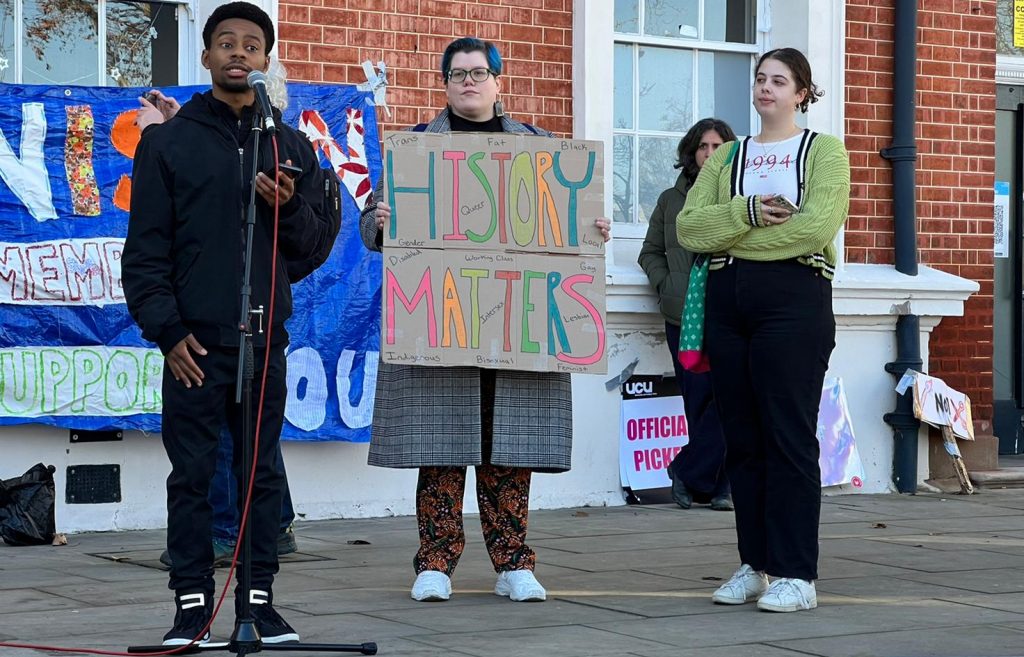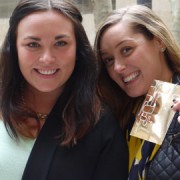
Hundreds of academic staff at Goldsmiths in New Cross have begun another extensive series of strikes in response to the university’s plans for 52 redundancies and administrative changes.
The strikes by members of the University and College Union follow a three week protest over the same issues last year, which led to hundreds of students missing lectures during November and December. This term’s sporadic strikes will continue until March 4 and some of the strike days coincide with a UCU national action with 63 other universities over working conditions and a long running dispute over the academic pension scheme.
On the first day of action on Monday, students from the History Department, which is one of two Goldsmiths departments scheduled for cutbacks and redundancies took to the picket line to speak out against the university’s Recovery Plan. Set out by Goldsmiths’ senior management team, the Recovery Plan is designed to help the University make cost savings to pay off a loan to Natwest and Lloyds and improve the universities finances.
Ayo Harty-Clarke, an undergraduate history student, speaking on the picket line, said: “We are here to speak out against the cuts and changes that are being made to our modules and our courses. Cut and changes decided by the managers of this university. These aren’t necessary.”
“I, like many of my peers, would have never been taught about Africa, the mother of civilisation, unless it was a story of subjugating or a whitewashed Egyptian history class [in school]. I finally thought I would get to study Black British History.”
“I might not be able to get that opportunity in my whole schooling life now. I’ve spoken to other people, and they very much value the module. We have world-renowned staff in that field.”
Seven full-time history staff are at risk of being made redundant at Goldsmiths – including some staff who are Black British History and Queer History lecturers. Established five year’s ago, the Department’s Queer History MA was the first in the world. Other cuts are facing the English and Creative Writing Department.
Tara Povey, Goldsmiths UCU President said: “GUCU are committed to negotiation in order to find a resolution of the dispute. We are disappointed that management has failed to respond to reasonable offers, and to minimise redundancies, which is their statutory obligation as employers. In rejecting all reasonable attempts to find a resolution, management are continuing to place a deeply unpopular and ideologically driven restructure above the interests of students.”
A spokesperson for Goldsmiths said: “Unfortunately our English and Creative Writing and History departments have been unable to meet their savings targets, which means that a number of academics within these departments remain at risk of redundancy.”
The spokesperson stressed that the proposals would not entail the discontinuation of Creative Writing, Black British and Caribbean literature, Black British History and Queer Studies teaching.
“The reality is Goldsmiths still needs to save £9m in ongoing spend by 2023 to put the College back on a sustainable financial footing. As no one has been able to suggest viable alternative proposals which would deliver these savings a number of staff remain at risk of redundancy,” they added.
Students claim that the act of removing any of these courses was an act of discrimination and say there has been no guarantee the studies would go ahead. Students say the moves come despite strong protests in 2019 over what they claim is the university’s institutionally racist and colonial structures when students occupied Deptford Town Hall, home to the University’s administrative offices, for many weeks.
“This has all been done in the face of Goldsmiths Anti-Racist occupation of the Deptford Town Hall in 2019,” said Harty-Clarke. “What kind of message are they sending to Lewisham? It has such a high proportion of people of African descent Asian descent – it’s a diverse borough.”




